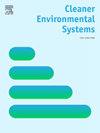以客户为中心的循环经济即服务决策:机器学习驱动的食品服务开放式创新
IF 4.9
Q2 ENGINEERING, ENVIRONMENTAL
引用次数: 0
摘要
本研究通过开发一个机器学习驱动的开放式创新框架来解决一个关键的研究空白,该框架用于优先考虑食品服务行业的循环经济即服务(CEaaS)措施。传统的可持续发展战略往往无法将动态的客户偏好与可扩展的循环经济实践相结合。为了弥补这一差距,本研究采用随机森林分类和特征选择来评估16个CEaaS措施对印度尼西亚和匈牙利食品服务市场客户满意度的影响。该框架基于prism指导的文献综述、客户调查和基于机器学习的决策分析。可持续采购、可重复使用包装系统和循环忠诚度计划成为最关键的CEaaS措施,反映了全球消费者对道德采购、最小化浪费和基于行为的参与的优先考虑。值得注意的是,剩余食物再分配和食物垃圾升级回收服务的排名一直很高,这突显出人们对可见循环和社会价值的期望越来越高。跨国模型验证验证了该框架的鲁棒性和泛化性。通过整合循环经济原则、客户洞察和机器学习,该研究推进了开放式创新理论,并为食品服务行业的可持续转型提供了可操作的指导。研究结果支持与负责任消费、气候行动、行业创新和全球伙伴关系相关的可持续发展目标。本文章由计算机程序翻译,如有差异,请以英文原文为准。
Customer-centric circular economy as-a-service decision-making: Machine learning-driven open innovation in food service
This study addresses a key research gap by developing a machine learning-driven open innovation framework for prioritizing Circular Economy as a Service (CEaaS) measures in the food service sector. Conventional sustainability strategies often fail to integrate dynamic customer preferences with scalable circular economy practices. To bridge this gap, this research employs Random Forest classification and feature selection to assess the impact of sixteen CEaaS measures on customer satisfaction across Indonesian and Hungarian food service markets. The framework is grounded in PRISMA-guided literature review, customer surveys, and machine learning-based decision analytics. Sustainable sourcing, reusable packaging systems, and circular loyalty programs emerge as the most critical CEaaS measures, reflecting global consumer priorities for ethical procurement, waste minimization, and behavior-based engagement. Notably, surplus food redistribution and food waste upcycling services rank consistently high, underscoring growing expectations for visible circularity and social value. The cross-country model validation confirms the framework's robustness and generalizability. By integrating circular economy principles, customer insights, and machine learning, the study advances open innovation theory and provides actionable guidance for sustainable transformation in the food service sector. The findings support Sustainable Development Goals related to responsible consumption, climate action, industry innovation, and global partnerships.
求助全文
通过发布文献求助,成功后即可免费获取论文全文。
去求助
来源期刊

Cleaner Environmental Systems
Environmental Science-Environmental Science (miscellaneous)
CiteScore
7.80
自引率
0.00%
发文量
32
审稿时长
52 days
 求助内容:
求助内容: 应助结果提醒方式:
应助结果提醒方式:


